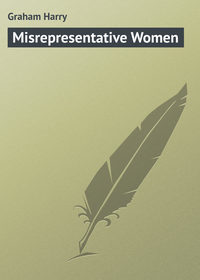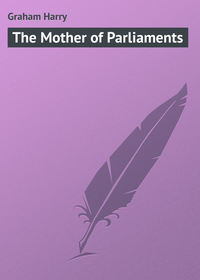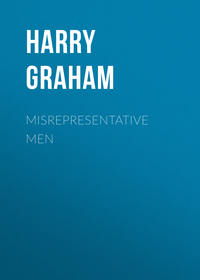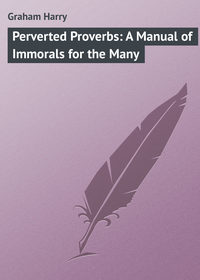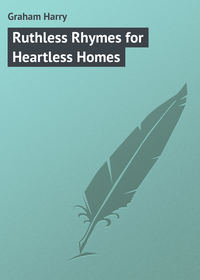More Misrepresentative Men
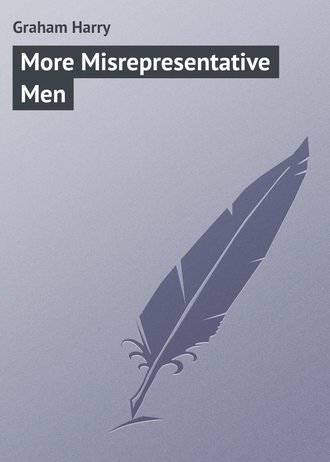 полная версия
полная версияMore Misrepresentative Men
Настройки чтения
Размер шрифта
Высота строк
Поля

Graham Harry
More Misrepresentative Men
Authors Foreword
(To the Publisher)WHEN honest men are all in bed,We poets at our desks are toiling,To earn a modicum of bread,And keep the pot a-boiling;We weld together, bit by bit,The fabric of our laboured wit.We see with eyes of frank dismayThe coming of this Autumn season,When bards are driven to displayTheir feast of rhyme and reason;With hectic brain and loosened collar,We chase the too-elusive dollar.While Publishers, in search of grist,Despise our masterly inaction,And shake their faces in our fist,Demanding satisfaction,We view with vague or vacant mindThe grim agreements we have signed.For though a willing public givesIts timely share of cash assistance,The author (like the dentist) livesA hand-to-mouth existence;And Publishers, those modern Circes,Make pig's-ear purses of his verses.Behold! How ill, how thin and pale,The features of the furtive jester!Compelled by contracts to curtailHis moments of siesta!A true White Knight is he to-day(Nuit Blanche, as Stevenson would say).Ah, surely he has laboured well,Constructing this immortal sequel, —A work which no one could excel,And very few can equal, —A volume which, I dare to say,Is epoch-making, in its way.When other poets' work is not,These verses shall retain their label;When Herford is a thing forgot,And Ade an ancient fable;When Goops no longer give a signOf Burgess's empurpled kine.My Publishers, I love you so!Your well-secreted virtues viewing;Who never let your right hand knowWhom your left hand is doing;Who hold me firmly in your grip,And crack your cheque-book, like a whip!My Publishers, make no mistake,You have in me an avis rara,So write a princely cheque, and makeIt payable to bearer;I love you, as I said before,But oh! I love your money more!Publisher's Preface
(To the Author)VORACIOUS Author, gorged with gold,Your grasping greed shall not avail!In vain you venture to unfoldYour false prehensile tale!I view in scorn (unmixed with awe)The width of your capacious maw.On me the onus has to fallOf your malevolent effusions;'Tis I who bear the brunt of allYour libellous allusions;To bolster up your turgid verse,I jeopardise my very purse!You do not hesitate to fleeceThe Publisher you scorn to thank,And when you manage to decreaseHis balance at the bank,Your face is lighted up with greed,And you are lantern-jawed indeed!Yet will I still heap coals of fire,Until your coiffure is imbedded,And you at last, perchance, shall tireOf growing so hot-headed,And realise that being funnyIs not a mere affair of money.And so, in honour of your pow'rs,A fragrant bouquet will I pick,Of rare exotics, blossoms, flow'rsOf speech and rhetoric;I'll add a thistle, if I may,And, round the whole, a wreath of bay.The blossoms for your button-hole,To mark your affluent condition,Exotics to inspire your soulTo further composition.Come, set the bays upon your brow!* * * * *Well, eat the thistle, anyhow!Robert Burns
THE jingling rhymes of Dr. WattsExcite the reader's just impatience,He wearies of Sir Walter Scott'sMelodious verbal collocations,And with advancing years he learnsTo love the simpler style of Burns.Too much the careworn critic knowsOf that obscure robustious diction,Which like a form of fungus growsAmid the Kailyard school of fiction;In Crockett's cryptic caves one sighsFor Burns's clear and spacious skies.Tho' no aspersions need be castOn Barrie's wealth of wit fantastic,Creator of that unsurpass'dIf most minute ecclesiastic;Yet even here the eye discernsNo master-hand like that of Burns.The works of Campbell and the restExhale a sanctimonious odour,Their vintage is but Schnapps, at best,Their Scotch is simply Scotch-and-sodour!They cannot hope, like Burns, to winThat "touch which makes the whole world kin."Tho' some may sing of Neil Munro,And virtues in Maclaren see,Or want but little here below,And want that little Lang, maybe;Each renegade at length returns,To praise the peerless pow'rs of Burns.His verse, as all the world declares,And Tennyson himself confesses,The radiance of the dewdrop shares,The berry's perfect shape possesses;And even William Wordsworth praisesThe magic of his faultless phrases.But he, whose books bedeck our shelves,Whose lofty genius we adore so,Was only human, like ourselves, —Perhaps, indeed, a trifle more so!And joined a thirst that nought could quenchTo morals which were frankly French.And ev'ry night he made his way,With boon companions, bent on frolic,To inns of ill-repute, where layRefreshments – chiefly alcoholic!(But I decline to raise your gorges,Describing these nocturnal orgies.)Of love-affairs he knew no end,So long and ardently he flirted,And e'en the least suspicious friendWould feel a trifle disconcerted,When Burns was sitting with his "sposa,""As thick as thieves on Vallombrosa!"A Cockney Chiel who found him thus,And showed some conjugal alarm,When Burns implored him not to fuss,Enquiring calmly, "Where's the harm?"Replied at once, with perfect taste,"The harm is round my consort's waist!""A poor thing but my own," said he,His fair but fickle bride denoting,And she, with scathing repartee,Assented, wilfully misquoting,(Tho' carefully brought up, like Jonah),"A poorer thing – and yet my owner!"The most bucolic hearts were burntBy Burns' amatory glances;The most suburban spinsters learntTo welcome his abrupt advances;When Burns was on his knee, 'twas said,They wished that they were there instead!They loved him from the first, in spiteOf angry parents' interference;They deemed his courtship so polite,So captivating his appearance;So great his charm, so apt his wit,In local parlance, Burns was IT!The rustic maids from far and wide,Encouraged his unwise flirtations;For love of Burns they moped and sighed,And, while their nearest male relationsWere up in arms, the sad thing isThat they themselves were up in his!His crest a mug, with open lid,The kind in vogue with ancient Druids, —Inscribed "Amari Aliquid,"(Which means "I'm very fond of fluids!"),On either side, as meet supporters,The village blacksmith's lovely daughters."Men were deceivers ever!" True,As Shakespeare says (Hey Nonny! Nonny!),But one should always keep in viewThat "tout comprendr' c'est tout pardonny";In judging poets it sufficesTo scan their verses, not their vices.…The poets of the present timeAttempt their feeble imitations;Are economical of rhyme,And lavish with reiterations;The while a patient public swallowsA "Border Ballad" much as follows: —Jamie lad, I lo'e ye weel,Jamie lad, I lo'e nae ither,Jamie lad, I lo'e ye weel,Like a mither.Jamie's ganging doon the burn,Jamie's ganging doon, whateffer,Jamie's ganging doon the burn,To Strathpeffer!Jamie's comin' hame to dee,Jamie's comin' hame, I'm thinkin',Jamie's comin' hame to dee,Dee o' drinkin'!Hech! Jamie! Losh! Jamie!Dinna greet sae sair!Gin ye canna, winna, shannaSee yer lassie mair!Wha' hoo!Wha' hae!Strathpeffer!I give you now, as antidote,Some lines which I myself indited.Carnegie, when he read them, wroteTo say that he was quite delighted;Their pathos cut him to the quick,Their humour almost made him sick.The queys are moopin' i' the mirk,An' gin ye thole ahin' the kirk,I'll gar ye tocher hame fra' work,Sae straught an' primsie;In vain the lavrock leaves the snaw,The sonsie cowslips blithely blaw,The elbucks wheep adoon the shaw,Or warl a whimsy.The cootie muircocks crousely craw,The maukins tak' their fud fu' braw,I gie their wames a random paw,For a' they're skilpy;For wha' sae glaikit, gleg an' din,To but the ben, or loup the linn,Or scraw aboon the tirlin'-pinSae frae an' gilpie?Och, snood the sporran roun' ma lap,The cairngorm clap in ilka cap,Och, hand me o'erMa lang claymore,Twa, bannocks an' a bap,Wha hoo!Twa bannocks an' a bap!…O fellow Scotsman, near and far,Renowned for health and good digestion,For all that makes you what you are, —(But are you really? That's the question) —Be grateful, while the world endures,That Burns was countryman of yours.And hand-in-hand, in alien land,Foregather with your fellow cronies,To masticate the haggis (cann'd)At Scottish Conversaziones,Where, flushed with wine and Auld Lang Syne,You worship at your country's shrine!William Waldorf Astor
HOW blest a thing it is to dieFor Country's sake, as bards have sung!How sweet "pro patria mori,"(To quote the vulgar Latin tongue);And yet to him the palm we giveWho for his fatherland can live.Historians have explained to us,In terms that never can grow cold,How well the bold HoratiusPlayed bridge in the brave days of old;And we can read of hosts of others,From Spartan boys to Roman mothers.But nowhere has the student got,From poet, pedagogue, or pastor,The picture of a patriotSo truly typical as Astor;And none has ever shown a greaterAffection for his Alma Mater.With loyalty to FatherlandHis heart inflexible as starch is,Whene'er he hears upon a bandThe too prolific Sousa's marches;And from his eyes a tear he wipes,Each time he sees the Stars and Stripes.Tho' others roam across the foamTo European health resorts,The fact that "there's no place like home"Is foremost in our hero's thoughts;And all in vain have people triedTo lure him from his "ain fireside."Let tourists travel near or far,By wayward breezes widely blown,He stops at the Astoria,"A poor thing" (Shakespeare), "but his own;"And nothing that his friends may doCan drag him from Fifth Avenue.The Western heiress is contentTo scale, as a prospective bride,The bare six-story tenementWhere foreign pauper peers reside;But men like Astor all disparageThe so-called Morgan-attic marriage.The rich Chicago millionaireMay buy a mansion in Belgravia,Have footmen there with powdered hairAnd frigidly correct behaviour;But marble stairs and plate of goldLeave Astor absolutely cold.The lofty ducal residence,That fronts some Surrey riverside,Would wound his socialistic sense,And pain his patriotic pride;He would not change for Castles HighlandHis cabbage-patch on Coney Island.A statue in some Roman street,A palace of Venetian gilding,Appear to him not half so sweetAs any modern Vanderbuilding;He views, without an envious throe,The wolf that suckled Romeo!Roast beef, or frogs, or sauerkraut,Their mead of praise from some may win;Our hero cannot do withoutPeanuts and clams and terrapin;Away from home, his soul would lackThe cocktail and the canvasback.Not his to walk the crowded Strand;'Mid busy London's jar and hum.On quiet Broadway he would stand,Saying "Americanus sum!"His smile so tranquil, so seraphic, —Small wonder that it stops the traffic!Who would not be a man like he,(This lapse of grammar pray forgive,)So simply satisfied to be,Contented with his lot to live, —Whether or not it be, I wot,A little lot, – or quite a lot?Content with any kind of fare,With any tiny piece of earth,So long as he can find it thereWithin the land that gave him birth;Content with simple beans and pork,If he may eat them in New York!O persons who have made your pile,And spend it far across the seas,Like landlords of the Em'rald Isle,Denounced notorious absentees,I pray you imitate the Master,And stay at home like Mr. Astor!But if you go abroad at all,And leave your fatherland behind you,Without an effort to recallThe sentimental ties that bind you,I should be grateful if you couldContrive to stay away for good!Henry VIII
WITH Stevenson we must agree,Who found the world so full of things,That all should be, or so said he,As happy as a host of Kings;Yet few so fortunate as notTo envy Bluff King Henry's lot.A polished monarch, through and through,Tho' somewhat lacking in religion,Who joined a courtly manner toThe figure of a pouter pigeon;And was, at time of feast or revelA … well … a perfect little devil!But tho' his vices, I'm afraid,Are hard for modern minds to swallow,Two lofty virtues he displayed,Which we should do our best to follow: —A passion for domestic life,A cult for what is called The Wife.He sought his spouses, North and South.Six times (to make a misquotation)He managed, at the Canon's mouth,To win a bubble reputation;And ev'ry time, from last to first,His matrimonial bubble burst!Six times, with wide, self-conscious smileAnd well-blacked, button boots, he enteredThe Abbey's bust-congested aisle,With ev'ry eye upon him centred;Six times he heard, and not alone,The march of Mr. Mendelssohn.Six sep'rate times (or three times twice),In order to complete the marriage,'Mid painful show'rs of boots and rice,He sought the shelter of his carriage;Six times the bride, beneath her veil,Looked "beautiful, but somewhat pale."Within the limits of one reign,Six females of undaunted bearing,Two Annes, three Kath'rines, and a Jane,Enjoyed the privilege of sharingA conjugal career so chequer'dIt almost constitutes a record!Yet sometimes it occurs to meThat Henry missed his true vocation;A husband by profession he,A widower by occupation;And, honestly, it seems a pityHe didn't live in Salt Lake City.For there he could have put in forceHis plural marriage views, unbaffled;Nor had recourse to dull divorce,Nor sought the service of the scaffold;Nor looked for peace, nor found release,In any partner's predecease.Had Henry been alive to-day,He might have hired a timely motor,And sent each wife in turn to stayWithin the confines of Dakota;That State whose rigid marriage-law,Is eulogised by Bernard Shaw.But Henry's simple days are done,And, in the present generation,A wife is seldom woo'd and wonBy prospects of decapitation.For nowadays when Woman weds,It is the Men who lose their heads!Alton B. Parker
THOSE Roman Fathers, long ago,Established a sublime tradition,Who gave the Man Behind the HoeHis proud proconsular position;When Cincinnatus left his hens,And beat his ploughshares into pens.His modern prototype we see,Descended from some humble attic,The Presidential nomineeOf those whose views are Democratic;From Millionaire to Billiard MarkerThey plumped their votes for Central Parker.A member of the sterner sex,Possessing neither wealth nor beauty,But gifted with a really ex —– Traordinary sense of Duty;In Honour's list I place him first, —With Cæsar's Wife and Mr. Hearst.From childhood's day this son of toil,Since first he laid aside his rattle,Was wont to cultivate the soil,Or milk his father's kindly cattle;To groom the pigs, drive crows away,Or teach the bantams how to lay.This sprightly lad, his parents' pet,With tastes essentially bucolic,Eschewed the straightcut cigarette,And shunned refreshments alcoholic;His simple pleasure 'twas to plumbThe deep-laid joys of chewing gum.As local pedagogue he nextAttained to years of indiscretion,To preach the Solomonian textSo popular with that profession,Which honours whom (and what) it teachesMore in th' observance than the breeches.The sprightly Parker soon one sees,Head of a legal institution,Enjoying huge retaining feesAs counsel for the prosecution.(Advice to lawyers, meum non est, —Get on, get honour, then get honest!)Behold him, then, like comet, shootBeyond the bounds of birth or station,And gain, as jurist of repute,A continental reputation.(Don't mix him with that "Triple Star"Which lights a more unworthy "bar.")A proud position now is his,A judge, arrayed in moral ermine,As from the Bench he sentencesHis fellow-man, and other vermin,And does his duty to his neighbour,By giving him six months' hard labour.On knotty questions of financeHe bears aloft the golden standard,For he whose motto is "Advance!"To baser coin has never pandered.No eulogist of War is he,"Retrenchment!" is his dernier cri.But tho', to his convictions true,With strength like concentrated Eno,He did his very utmost toEmancipate the Filipino,A fickle public chose Another,Who called the Coloured Coon his Brother.Euclid
WHEN Egypt was a first-class Pow'r —When Ptolemy was King, that is,Whose benefices used to show'rOn all the local charities,And by his liberal subscriptionsWas always spoiling the Egyptians —The Alexandrine School enjoyedA proud and primary positionFor training scholars not devoidOf geometric erudition;Where arithmetical fanaticsCould even live in (mathem) – attics.The best informed Historians nameThis Institution the possessorOf one who occupied with fameThe post of principal Professor,Who had a more expansive brainThan any man – before Hall Caine.No complex sums of huge amountsPerplexed his algebraic knowledge;With ease he balanced the accountsOf his (at times insolvent) College;He was, without the least romance,A very Blondin of Finance.In pencil, on his shirt-cuff, he,Without a moment's hesitation,Elucidated easilyThe most elab'rate calculation(His washing got, I needn't mention,The local laundry's best attention).Behind a manner mild as mouse,Blue-spectacled and inoffensive,He hid a judgment and a nousAs overwhelming as extensive,And cloaked a soul immune from wrongBeneath an ample ong-bong-pong.To rows of conscientious youths,Whom 'twas his duty to take care of,He loved to prove the truth of truthsWhich they already were aware of;They learnt to look politely bored,Where modern students would have snored.To show that Two and Two make Four,That All is greater than a Portion,Requires no dialectic lore,Nor any cerebral contortion;The public's faith in facts was steady,Before the days of Mrs. Eddy.But what was hard to overlook(From which Society still suffers)Was all the trouble Euclid tookTo teach the game of Bridge to duffers.Insisting, when he got a quorum,On "Pons" (he called it) "Asinorum."The guileless methods of his gameProvoked his partner's strongest strictures;He hardly knew the cards by name,But realised that some had pictures;Exhausting ev'rybody's patienceBy his perpetual revocations.For weary hours, in deep concern,O'er dummy's hand he loved to linger,Denoting ev'ry card in turn,With timid indecisive finger;And stopped to say, at each delay,"I really don't know what to play!"He sought, at any cost, to winHis ev'ry suit in turn unguarding;He trumped his partner's "best card in,"His own egregiously discarding;Remarking sadly, when in doubt,"I quite forgot the King was out!"Alert opponents always knew,By what the look upon his face was,When safety lay in leading through,And where, of course, the fatal ace was;Assuring the complete successesOf bold but hazardous "finesses."But nowadays we find no trace,From distant Assouan to Cairo,To mark the place where dwelt a raceMistaught by so absurd a tyro;And nothing but occult inscriptionsRecall the sports of past Egyptians.Yes, "autre temps" and "autre moeurs,""Où sont indeed les neiges d'antan?"The modern native much prefersDebauching in some café chantant,Nor ever shows the least ambitionTo solve a single Proposition.O Euclid, luckiest of men!You knew no English interloper;For Allah's Garden was not thenThe pleasure-ground of Alleh Sloper,Nor (broth-like) had your country's looksBeen spoilt by an excess of "Cooks."The Nile to your untutored earsDiscoursed in dull but tender tones;Not yours the modern Dahabeahs,Supplied with strident gramophones,Imploring, in a loud refrain,Bill Bailey to come home again.Your cars, the older-fashioned sort,And drawn, perhaps, by alligators,Were not the modern Juggernaut-Child-dog-and-space-obliterators,Those "stormy petrols" of the landWhich deal decease on either hand.No European tourist wagsDefiled the desert's dusky faceWith orange peel and paper bags,Those emblems of a cultured race;Or cut the noble name of Jones,On tombs which held a monarch's bones.O Euclid! Could you see to-dayThe sunny clime you once frequented,And note the way we moderns playThe game you thoughtfully invented,The knowledge of your guilt would force yerTo feelings of internal nausea!J. M. Barrie
THE briny tears unbidden start,At mention of my hero's name!Was ever set so huge a heartWithin so small a frame?So much of tenderness and graceConfined in such a slender space?(O tiniest of tiny men!So wise, so whimsical, so witty!Whose magic little fairy-penIs steeped in human pity;Whose humour plays so quaint a tune,From Peter Pan to Pantaloon!)So wide a sympathy has he,Such kindliness without an end,That children clamber on his knee,And claim him as a friend;They somehow know he understands,And doesn't mind their sticky hands.And so they swarm about his neck,With energy that nothing wearies,Assured that he will never checkTheir ceaseless flow of queries,And grateful, with a warm affection,For his avuncular protection.And when his watch he opens wide,Or beats them all at blowing bubbles,They tell him how the dormouse died,And all their tiny troubles;And drag him, if he seems deprest,To see the baby squirrel's nest.For hidden treasure he can dig,Pursue the Indians in the wood,Feed the prolific guinea-pigWith inappropriate food;Do all the things that mattered soIn happy days of long ago.All this he can achieve, and more!For, 'neath the magic of his brain,The young are younger than before,The old grow young again,To dream of Beauty and of TruthFor hearts that win eternal youth.Fat apoplectic men I know,With well-developed Little Marys,Look almost human when they showTheir faith in Barrie's fairies;Their blank lethargic faces lightenIn admiration of his Crichton.To lovers who, with fingers cold,Attempt to fan some dying ember,He brings the happy days of old,And bids their hearts remember;Recalling in romantic fashionThe tenderness of earlier passion.And modern matrons who can findSo little leisure for the Nurs'ry,Whose interest in babykindIs eminently curs'ry,New views on Motherhood acquireFrom Alice-sitting-by-the-Fire!While men of every sort and kind,At times of sunshine or of trouble,In Sentimental Tommy findTheir own amazing double;To each in turn the mem'ry comesOf some belov'd forgotten Thrums.To Barrie's literary artThat strong poetic sense is clingingWhich hears, in ev'ry human heart,A "late lark" faintly singing,A bird that bears upon its wingThe promise of perpetual Spring.Materialists may labour muchAt problems for the modern stage;His simpler methods reach and touchThe Young of ev'ry age;And first and second childhood meetOn common ground at Barrie's feet!Omar Khayyam
THOUGH many a great PhilosopherHas earned the Epicure's diploma,Not one of them, as I aver,So much deserved the prize as Omar;For he, without the least misgiving,Combined High Thinking and High Living.He lived in Persia, long ago,Upon a somewhat slender pittance;And Persia is, as you may know,The home of Shahs and fubsy kittens,(A quite consistent habitat,Since "Shah," of course, is French for "cat.")He lived – as I was saying, whenYou interrupted, impolitely —Not loosely, like his fellow-men,But, vicê versâ, rather tightly;And drank his share, so runs the story,And other people's, con amore.A great Astronomer, no doubt,He often found some ConstellationWhich others could not see withoutProfuse internal irrigation;And snakes he saw, and crimson mice,Until his colleagues rang for ice.Omar, who owned a length of throatAs dry as the proverbial "drummer,"And quite believed that (let me quote)"One swallow does not make a summer,"Supplied a model to societyOf frank, persistent insobriety.* * * * *Ah, fill the cup with nectar sweet,Until, when indisposed for more,Your puzzled, inadhesive feetElude the smooth revolving floor.What matter doubts, despair or sorrow?To-day is Yesterday To-morrow!Oblivion in the bottle win,Let finger-bowls with vodka foam,And seek the Open Port withinSome dignified Inebriates' Home;Assuming there, with kingly air,A crown of vine-leaves in your hair!A book of verse (my own, for choice),A slice of cake, some ice-cream soda,A lady with a tuneful voice,Beside me in some dim pagoda!A cellar – if I had the key, —Would be a Paradise to me!In cosy seat, with lots to eat,And bottles of Lafitte to fracture(And, by-the-bye, the word La-feetRecalls the mode of manufacture) —I contemplate, at easy distance,The troublous problems of existence.For even if it could be mineTo change Creation's partial scheme,To mould it to a fresh design,More nearly that of which I dream,Most probably, my weak endeavourWould make more mess of it than ever!So let us stock our cellar shelvesWith balm to lubricate the throttle;For "Heav'n helps those who help themselves,"So help yourself, and pass the bottle!…What! Would you quarrel with my moral?(Waiter! Leshavanotherborrel!)

